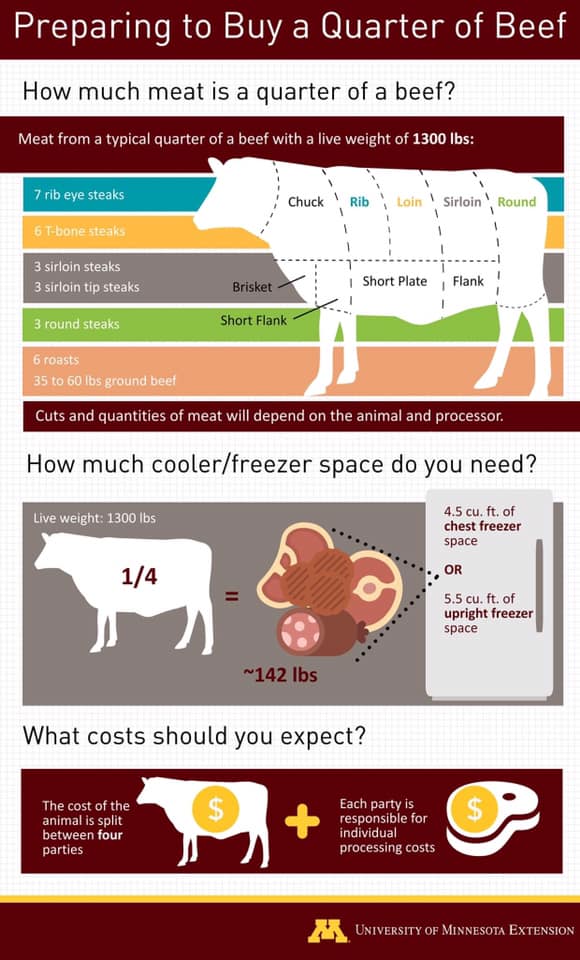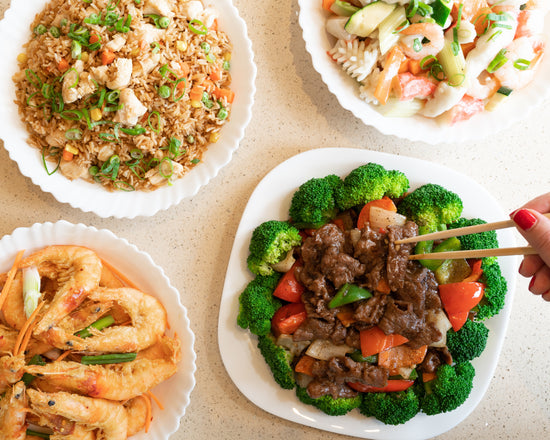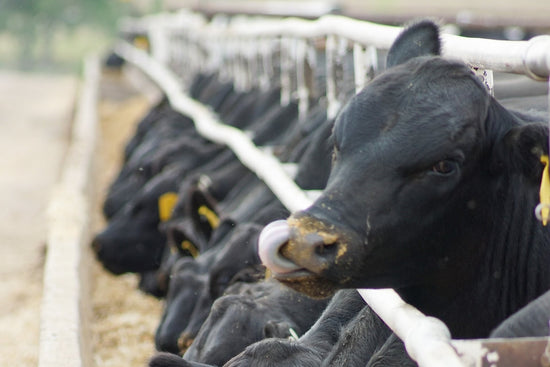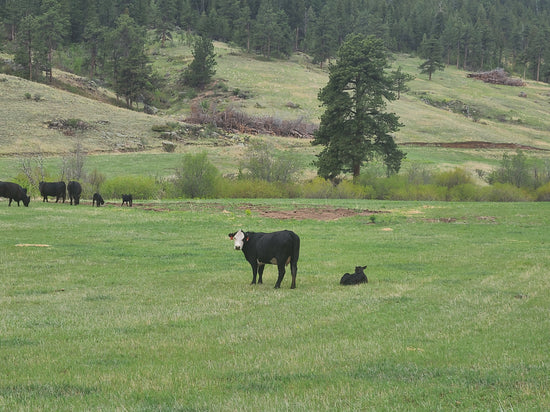Beef Info
Questions often asked...

How do I get MVM beef?
Stop in our farm store Mon, Wed, Fri. from 1pm-5pm to pick out individual cuts of beef and pork.
Order online and we offer a variety of ways to get your order!
- Pick up at our feed yard store on Mon, Wed, Fri. from 1pm-5pm: 5202 North County Rd 19, Fort Collins, CO 80524. Cash discount is 3%.
- FREE local delivery with $100+ orders (Fort Collins, Loveland, Wellington, Timnath, Windsor, LaPorte, Bellvue).
3. Ship to your door: We ship every Monday.
These options should show up in the checkout page. If not, please make a note at checkout or give us a call!
Do you sell individual cuts?
YES! At Farmer's Markets and in our farm store (MWF 1-5pm) at 5202 North County Rd 19, Fort Collins, CO 80524
SOMETIMES we will post extra cuts on our website.
Call, text or email for individual cut and organs availability.
Do you accept SNAP EBT payments?
YES! We do accept SNAP EBT in our farm store. When ordering online, select SNAP EBT at checkout and we will complete the payment at the time of pick up.
How is the beef cut and packaged?
- All of our product is individually packaged and vacuum-sealed
- Ground beef is about 85/15 and packaged in ~1 lb packages; sometimes we do have ~90/10
- 1/3 lb. hamburger patties are usually 4 to pack
- Steaks are cut 1-1.5"
Our beef is USDA-inspected and processed at Bear Mountain Beef in Hawk Springs, WY. The USDA states frozen, well-sealed beef can last "for a long time" (we have personally stored beef for 2+ years), but they recommend 12 months.
Vacuum seals are not perfect. Over time and with handling, the seal can break and lose the vacuum. There may be cuts that do lose their seal and should be used ASAP for best quaility.
Where are they processed?
Our cattle are processed at Bear Mountain Beef in Hawk Springs, WY. We are part owners in this business and therefore are able to have a good relationship with the processors. Bear Mountain Beef is a USDA-Inspected facility and we are able to age the beef for 14+ days.
How long is the beef aged?
Our beef is aged for a minimum of 14 days. Aging the beef in a chilled environment allows natural processes to improve flavor and tenderness.
Do you ship or deliver?
We do ship. As we're still fine-tuning the process, we appreciate your patience. Here’s what you need to know:
- Shipping Schedule: Orders ship out on Mondays.
- Packaging: Your products will be shipped frozen with dry ice and ice packs. Some items may partially thaw during transit. If they arrive partially thawed, you can safely refreeze them or continue thawing in the refrigerator.
- Thawed Products: If your order arrives completely thawed and warm (without any shipping delays), please contact us.
Please Note: We pack sufficient ice and dry ice to maintain the product for 2-3 days in transit. However, we cannot control potential delays by FedEx. Therefore, we are not responsible if the product arrives thawed due to FedEx delays. - Shipping Availability: We currently ship to the contiguous 48 states. Unfortunately, we do not ship to Hawaii or Alaska.
- Shipping Costs: Shipping fees vary based on your location and order size, especially if 2-day air shipping is required. Enter your address at checkout to calculate the shipping cost. If the actual shipping cost is higher than listed, we’ll contact you before proceeding.
- Sustainability: To help reduce costs, we try to reuse boxes, packing materials, and insulated coolers.
Thank you for your understanding and support as we expand our shipping!
We offer FREE local delivery with orders over $75. Select the delivery option and enter your zip to see if you are in our delivery area. Our deliveries days are MWF 1-5pm or contact us to make special arrangements.
How much freezer space will I need?
Approx 1 -1.5 cu. ft. of freezer space needed for 25 lbs of beef. More space is better to allow sorting and better airflow between packages.
Can I custom cut to my instructions or substitute different cuts?
Our bundles are personally divided equally and pre-packed with already chosen cuts. Therefore, we are unable to substitute cuts in our signature bundles. If you would like to choose your cuts, we suggest having a ½ beef custom cut with your instructions.
How old are your animals when they are processed?
We finish our cattle at 18-22 months of age, generally around 1,200 - 1,300 lbs. Per USDA rules any cattle over the age of 30 months must be boneless cuts. We raise the cattle from the calf and oversee the growth and health until the finished product. All cattle records are managed through an online program that tracks their fed and health records.
What kind of cattle are they?
Our cattle are Angus influence, crossed with other prominent English breeds (Hereford, Charolais, Red Angus, Holstein). Although genetics is an important factor in quality, the most influence of quality and taste comes from how they are raised and fed. We keep an eye and records on all of our cattle from calf to finished product, including the processing.
What do you feed the cattle?
For the final 120–130 days, the cattle are on a high-protein ration carefully crafted by our feedlot nutritionist. This diet may include spent brewers/distillers grain, alfalfa, hay or straw, corn silage, cracked corn, and a blend of essential vitamins and minerals. It is designed to provide all the nutrients necessary for optimal muscular development and overall health.
Do you use added hormones?
Supplemental hormones play a significant role in the beef cattle industry by improving feed efficiency, which ultimately results in cattle with reduced environmental impacts.
More about cattle hormones:
However, we do not utilize supplemental hormones in our cattle. Instead, we focus on optimizing genetics along with feed rations designed by a cattle nutritionist. This approach allows us to raise our cattle efficiently and sustainably without the need for supplemental hormones.
Do you use antibiotics?
Just like in humans, antibiotics are used in our operation only when it is deemed necessary for the health and well-being of our animals. Typically, antibiotics are administered to address respiratory issues, and are carried out under the guidance and protocols of our veterinarian. Fortunately, illness within our herd is relatively infrequent, particularly due to our proactive approach to cattle health and welfare. We prioritize preventative measures to minimize the need for antibiotics. Usually, it is the younger cattle that need treatment, not our older ones that are close to harvest. In cases where an older animal does experience chronic illness and ongoing treatment, we do not include them in our beef program. All cattle (ours or other operations) must adhere to the safety standards of antibiotic use and the withdrawal period prior to harvest.
How do I cook beef?
The website Beef. It's What's For Dinner is a great resource for beef, everything from the cuts and how to cook them, to many recipes by the cut. You can also find nutritional information and beef cut charts.
We often share beef recipes on our Facebook page and in our weekly emails.
More Beef Info
-

Protein Benefits
Protein Benefits Infographic - from Beef. Its Whats For DinnerWHY BEEF?
"A 3-oz serving of cooked beef provides approximately 25 grams of high-quality protein plus 9 other essential nutrients in one tasty package. High-quality protein, like beef, contains the essential amino acid leucine, which research shows activates the muscle-building switch in the body." -

Grain-Finished Vs. Grass-Finished
Continue reading: Grain-Finished vs. Grass-Finished Info - From Beef. It's What's For DinnerNUTRITION FACTS
"The only nutritional differences between the various beef choices relate to the fatty acid content and profile of grain-finished beef versus grass-finished beef. Many cuts of both grain-finished and grass-finished beef meet USDA guidelines for lean.* In general, grass-finished beef tends to be leaner than grain-finished beef; however, as shown below, with its higher monounsaturated fat content,the fatty acid profile of grain-finished beef may be more conducive to better health outcomes." -

Beef Sustainability
Beef Sustainability Facts - from Beef. It's What's For DinnerCONVERT PLANTS TO PROTEIN
"Cattle upcycle human-inedible plants into high-quality protein, which generates more protein for the human food supply than would exist without them."



